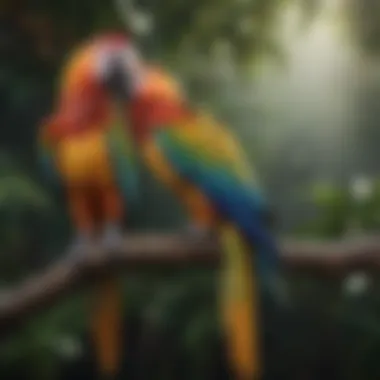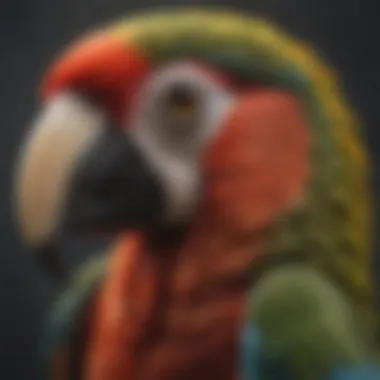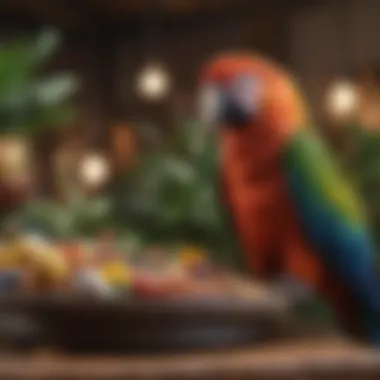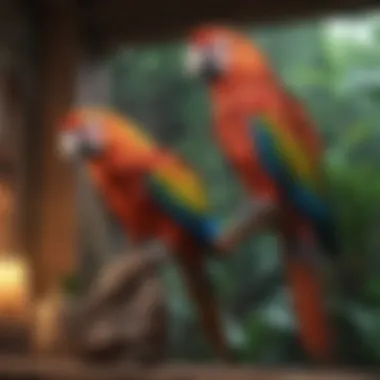Understanding the Financial Commitment of Macaw Parrots


Intro
Owning macaw parrots is a lavish pursuit and sooner or later, potential bird owners discover that the financial implications extend far beyond the initial purchase price. Macaws are not just vibrant companions; they demand substantial devotion in terms of their needs and well-being. This article seeks to unravel the various layers of expenditures associated with macaw ownership. This understanding is critical for safeguarding both the financial and emotional well-being of the bird and owner.
With proper insights, prospective pet parents can make astute decisions, avoiding pitfalls of underestimating cost complexities. This article structures itself around critical aspects of avian care that contribute to the potential cost of ownership, setting the ground as we delve into the various influences shaping expenses, from essential nutritional needs to health care requirements.
Avian Care Basics
Importance of Proper Nutrition
For any macaw owner, grasping the essentiality of nutrition is paramount. Macaws need a balanced and diverse diet to maintain their health and vibrant feathers. Quality pellets, various fresh fruits, and entrees are just as vital. Budget variations in food preferences arise mainly from whether one opts for commercial brands or seeks fresh produce from local markets.
Understanding nutritional input demands time and willingness to research the correct combinations—a factor often overlooked until it's too late. A yearly food budget could run between $500 and $1,500 based on dietary diversity.
Understanding Bird Species and Their Needs
Macaws come in varied species, each possessing unique requirements that impact overall care costs. Every species has different social needs, personality traits, and specific health concerns. Recognizing these identities will directly influence expenditure and selection of appropriate accessories. Additionally, geriatric birds might require specialized diets or hand-feeding—a cost impost that must not be overlooked.
Basics of Birds Habitat Setup
An adequate habitat setup for macaws involves more than a simple cage; it requires thoughtful design specializing in space and stimulation. Cages should be self-contained yet spacious enough to allow for movement—this could easily require $400 to $2,000 based on material quality and size. Essential furnishings such as toys and perches also sustain birds engaging in regular exercise and mental stimulation, adding to the costs without gaining immediate visibility.
Grooming and Hygiene Tips
Grooming activities like nail trimming, beak care, and feather maintenance, while not initially expensive, can pile up over time. Between professional grooming services and investing in tools, smooth expenses form a scenario where one could pay $200 to $500 yearly. Colorful coats and clean nails offer removal of potential health risks while boosting the proprietor-bird relationship.
In recap, fundamental avian care encapsulates several categories of expenses inherently challenging to project, thus, establishing foresight into the direct and indirect costs linked to thriving macaw birds is crucial for prospective birdkeepers.
Foreword to Macaw Parrots
Understanding macaw parrots is crucial for anyone considering them as pets. Known for their vibrant colors and remarkable intelligence, macaws require significant investment in terms of time, money, and emotional commitment. This section sets the stage for discussing financial implications of ownership by delving into their diverse species and characteristics.
Overview of Macaw Species
Macaws belong to the family Psittacidae, which consists of several species differentiated by their unique colors, sizes, and personalities. The most notable species include the Blue and Gold Macaw, Scarlet Macaw, Green-winged Macaw, and Hyacinth Macaw. Differences in size play a notable role in the costs involved. For instance, Blue and Gold Macaws typically cost between $1,200 to $1,500, while the rarer Hyacinth Macaws can command prices well over $10,000. Other important species to consider are:
- Scarlet Macaw: Known for its stunning red, yellow, and blue feathers, it’s a symbol of rainforest ecosystems.
- Green-winged Macaw: Similar in appearance to the Scarlet, the Green-winged is known for its green feathers and cost-effective price range.
These diversities not only enhance their visual appeal but also signal differences in care. Some species may require specific environments, varied diets, and focused interactions that affect overall owning costs.
Characteristics of Macaws
Macaws display characteristics that set them apart from other bird species. They are highly social and intelligent creatures. Understanding these traits is essential for prospective owners.
- Social Needs: Macaws thrive on consistent human interaction. Loneliness can lead to behavioral issues such as excessive screaming or feather plucking. Full engagement, possibly through regular camaraderie or training, is greatly recommended.
- Longevity: Many macaws live for over 30 years, making them a lifetime commitment. This longevity implies a long-term financial and emotional engagement—a significant aspect that potential buyers must consider.
- Cognitive Abilities: Their intelligence warrants intellectual stimulation. Toys for cognition, training sessions, and time for play must be factored into ongoing expenses. Caring for these birds goes beyond feeding; it includes mental health and enriched experiences.
Tip: Consider if your lifestyle allows for the demands required by a macaw on both a time and financial basis before committing to ownership.
Initial Purchase Costs


Understanding the initial purchase costs of macaw parrots is crucial for anyone considering these magnificent birds as companions. While many prospective owners may focus on aspects such as bonding or behavior, overlooking the financial implications can lead to unexpected challenges down the line. This section explores the scope of initial costs to help future bird owners prepare well.
Price Range of Different Macaw Species
When it comes to the prices of macaw parrots, there is a pronounced variation across different species. Some of the most well-known species and their approximate price ranges include:
- Blue-and-yellow Macaw: Generally priced between $1,000 and $2,000.
- Green-winged Macaw: Typically ranges from $1,500 to $3,000.
- Scarlet Macaw: Prices can go from $1,500 up to $3,500.
- Military Macaw: Usually costs about $750 to $1,500.
Various factors such as age, breeder reputation, and availability can influence these price tags. More exotic variations may command even higher costs, as breeding trends shift among enthusiasts.
Factors Affecting Initial Costs
Several factors can affect the initial cost of acquiring a macaw. Important considerations include:
- Breeder or Seller Reputation: Choosing a reputable breeder may incur higher expenses. However, this ensures better health guarantees and lineage.
- Age and Training Status: Young macaws may present a lower upfront cost compared to older birds. Training or tameness also influences price.
- Location and Availability: Prices can vary by region. Availability can heighten or lower costs significantly.
- Source of Purchase: Buying from pet shops often leads to increased prices due to overhead costs. On the other hand, adopting from rescues may lower financial burdens.
In summary, understanding the nuances behind suggestive price tags is key. Consideration of these factors fosters informed decisions, ensuring potential macaw owners do not encounter negative surprises. Closely examine prices in context with your preferences and financial situations.
Ongoing Expenses
Understanding the ongoing expenses related to owning macaw parrots is crucial for prospective bird owners. Financial commitment extends far beyond the initial purchase price. It encompasses daily care, health care, housing, and other essential factors. A detailed grasp of these ongoing costs will help potential owners prepare for the long-term responsibilities.
Feeding and Nutrition Costs
Feeding a macaw involves more than just providing seeds. A well-rounded diet for these birds is essential for their long-term health and longevity. Macaws primarily require a varied diet that includes high-quality pellets, fresh fruits, vegetables, nuts, and sometimes cooked grains.
- Quality of food largely impacts overall expenses. High-quality diets promote better health but often come at a higher cost. On average, you can expect to spend between $30 to $50 monthly on food alone.
- Owning multiple macaws raises that monthly cost, requiring bulk purchases of favored foods.
- Seasonal foods, like fruits, may fluctuate in price. You should adjust your budget based on market availability, ensuring that your birds receive a nutritious and varied diet.
Failing to provide an adequate diet can lead to health problems, resulting in increased veterinary costs later.
Health Care and Veterinary Expenses
Owning a macaw requires a commitment to regular health care and veterinary check-ups. Selecting an avian veterinarian familiar with parrots is key; they have specialized knowledge that can save time and money. Since macaws are susceptible to several health issues, preventative care is vital.
Regular vets can charge anywhere from $50 to $200 for check-ups, depending on your location and the services provided.
- Routine visitations often include check-ups, vaccinations, and tests for feather and beak conditions.
- Emergency expenses can lead to unforeseen costs. It's advisable to earmark up to $300 to $500 a year for these potential emergencies and regular health care.
- Preventive medications or treatments, if necessary, can escalate costs further. Consistent monitoring is essential to detect potential issues early, mitigating larger expenses down the line.
Considering the potential costs associated with health care and check-ups, budgeting ahead promotes both income stability and responsible pet ownership.
Housing and Enrichment Requirements
Providing an adequate living environment is fundamental for any macaw’s well-being. They require large cages that offer enough room to move around, exercise, and play. The initial costs can run significantly high based on size and quality but serious dog-owing done will see great avian happiness without pricing harm.
- Cage costs commonly range from $200 to $1000, depending on size, brand, and material. Higher quality and larger cages will correlate with higher pricing.
- Enrichment costs such as toys, branches for perches, and even hanging ropes should not be overlooked. A dedicated ans thorough budget for toys can fall between $50 and $200 annually, if distributed wisely every month.
- Maintenance of the living environment additionally requires regular cleaning and, if formal or thorough systems are adopted, special cleaning supplies add an additional cost, $100 universal examples suitable for their health.
Ensuring that a comfortable space exists with proper attention to the welfare of macaws positions owners to enjoy or exceptional companionship that coats their investment in loving trust and bonds developed.
Comparative Analysis of Macaw Costs
Evaluating the comparative costs associated with macaw ownership is critical for prospective owners. Understanding how macaws measure up against other parrot species can shift perspectives on the investment required, both financially and in terms of commitment. This section delves into the nuances between macaws and other families of parrots while also highlighting regional price variations that could significantly impact total ownership costs.


Macaws Versus Other Parrot Species
When assessing the financial implications of macaw ownership, it is essential to consider how their costs compare to other types of parrots, such as cockatoos and African greys. While macaws are undoubtedly majestic, they are often more expensive upfront and over the lifetime of ownership.
Key differences include:
- Purchase Prices: Macaw prices typically start from $1,000, depending on species and color. In contrast, other parrot species such as conures may start as low as $300.
- Ongoing Costs: Larger birds like macaws will necessitate more significant food portions, often necessitating a change in dietary expenditure. Ideal macaw diets can range from $200 to $400 annually, compared with smaller species costing around $100 yearly.
- Healthcare Needs: Macaws might have special health considerations due to their size and comparative vulnerability to certain diseases, leading to potentially higher veterinary bills.
Understanding these distinctions helps potential owners gauge whether the splendid personality and intelligence of macaws justifies their substantial costs.
Possessing macaws involves more than initial purchase. Prospective owners must consider long-term financial and emotional investments.
Regional Price Variations
Prices for macaws can differ considerably based on geographic location. Regional market dynamics, including breeding practices and availability, impact the cost.
Considerations include:
- Market Demand: Regions with high bird ownership rates, such as California, could offer steeper prices due to demand. Conversely, less populous areas may have lower costs but also fewer available birds.
- Breeding Sources: Direct purchases from reputable breeders could lead to costs differing from those found in pet shops or online listings. Reputable breeders typically guarantee the health and lineage of the bird, which can increase prices.
- Transportation Costs: Acquiring macaws from distant breeders may introduce additional expenses in terms of transport or delivery services.
Recognizing these variations can assist buyers in budgeting. Savvy planning ensures adequate setera mental allocation aside for successful ownership over time, but prospects must be prepared for fluctuations in bird prices across regions.
Potential Hidden Costs
Understanding the potential hidden costs of owning macaw parrots is critical for anyone considering these complex animals. While the upfront purchase price can be visible, the ongoing consequences of care and unforeseen circumstances can complicate a bird owner's financial landscape. The objective here is to shed light on specific elements, benefits, and considerations surrounding these often-overlooked expenses.
Unexpected Health Issues
Similar to other pets, macaws can face unexpected health problems throughout their life. A common misconception is that exotic birds like macaws rarely get sick or have few medical needs. However, this isn't accurate. Birds can develop various ailments, from feather cysts to avian stomachaches, which might require veterinary attention.
The cost of veterinary care can become significant, and it is not just about the regular check-ups. Avian veterinarians often charge higher fees compared to general pet doctors. If the bird needs specialized treatment or even emergency care, these expenses can accumulate quickly.
Here are some healthcare costs that owners should consider:
- Initial health check-up
- Routine blood tests
- Medication for illnesses or injuries
- Surgical interventions and post-operative care
- Chronic care medication for ongoing conditions
Behavioral Training Expenses
Behavioral training can also incur hidden costs. Macaws are highly intelligent birds but they need proper training to adapt well to home environments. Various behavioral issues may surface, such as biting or screaming, if the birds do not get proper guidance.
Training can be both time-consuming and financially burdensome. Professional training sessions might be necessary for proper guidance, depending on the individual bird’s temperament and issues. The costs might vary widely based on your locality and the expertise of the trainer.
Consider the following training expenses:
- Professional trainer fees
- Classes or workshops for owners
- Informational books or online courses on macaw behavior
- Behavioral modification supplies like toys to encourage learning
Financial Responsibility of Owning Macaws
Owning a macaw is not just a whim; it is a significant long-term commitment that comes with various financial implications. Understanding these responsibilities is essential for any prospective owner. These beautiful and intelligent birds require careful consideration of both initial and ongoing costs. They provide companionship and interaction, yet come with demands such as quality food, regular check-ups, and enriched housing. As we explore this subject, it is crucial to grasp that financial planning plays a key role in successful macaw ownership.
Long-Term Financial Commitment


When considering a macaw, potential owners must recognize that the initial purchase price is only a small portion of the full financial picture. Macaws can live up to 50 years or more. Hence, the total invested over their lifetime can be substantial. The commitment extends far beyond just the price of acquisition; it encompasses various aspects like continuous feeding, healthcare, and living expenses.
Additionally, the choice of species can impact not only initial costs but ongoing expenses. For instance, Hyacinth macaws may require a higher nutritional input than other species due to their size and unique dietary needs. Consequently, a thorough understanding of long-term costs ensures that the decision to purchase is worthwhile and sustainable. It is wise for owners to possibly set aside a monthly budget to prepare for these future expenses.
Industry Insights
Understanding the industry surrounding macaw parrots is crucial for potential owners and stakeholders. Not comprehensive knowledge will ease decision-making but it will prête vague understanding of existing market dynamics too. Analyzing industry trends and legislative impacts provides insights crucial for discerning financial implications.
Among the specific elements to consider are updates in macaw breeding practices and the effects of local and national legislation on both pricing and parentage. Both factors essentially influence not just the cost of purchase, but also ownership experience and access to information about reliable breeding sources. Having a clear grasp of these industry currents fosters potential owners' preparedness.
Moreover, acclimating with these trends also yields multiple benefits. For instance, knowledge about prevailing prices for different macaw species can guide users about useful budgeting strategies, enabling prospective owners to achieve better preparation in advance. The reflection on ethics in breeding notably has potential implications for ensuring healthy and well-adjusted birds, a crucial concern for avian welfare advocates.
In summary, diving into industry insights aids both potential guardians and the industry itself, stimulating educated choices based on up-to-date market states.
Trends in Macaw Breeding and Pricing
Over the past years, trends in macaw breeding indicate movements toward more responsible practices. Breeders increasingly focus on breeding healthy, well-socialized birds rather than merely concentrating on quantity. This shift possivel contribute to higher prices due to the demand for quality and ethical breeding standards. Importantly macaws raised in healthy environments generally adapt better to new homes, increasing their chance of success as pet companions.
Local breeders have become especially relevant as avian enthusiasts steer toward responsible ownership. This often shifts potential owners’ interests away from birds sourced unethically across broader markets. Educational resources are also more available, leading to enhanced understanding of breeding and health specifications.
It's notably common to witness those interested in macaws delve deeper before culminating in a purchase. Informing pet owners enables them to discover fair price points tailored according to the specific species and its rarity.
Impact of Legislation on Macaw Prices
Legislation compellingly shapes the landscape of owning avian pets, including macaws, affecting their prices as a direct result. Various laws regulate breeding practices, trade, and ownership of specific species. Particularly strict laws aim to protect endangered macaw species while promoting the well-being and regulatory safety for owners.
Rulings on wildlife trade have essential influences on costs too. Owners may find it harder to access birds without substantiated pedigrees from preferred breeding netreworks. Thus, birds that follow legalities typically assume premium value in direct consequence of compliance. Conversely, legislation aiming to regulate illegal practices can yield an attractions for higher prices
Important considerations include:
- Compliance with CITES regulations, impacting the international sale of macaws.
- Local hunting levels and physical threats, potentially raising breeding demand when supply decreases; and thus adjacency indirectly feeding into pricing variations as potential robins facing while leading to availability challenges.
A detailed understanding of these factors, brings more richness to arguments considering financially committing to pet ownership.
Finale
The conclusion serves as a critical element of this article by tying together all the financial facets of owning macaw parrots. Understanding these aspects is essential for anyone considering investing time and money into these magnificent creatures. The earlier sections highlight initial purchase costs, ongoing expenses, as well as potential hidden costs that can arise over time. These details assist prospective owners in grasping the total financial commitment required.
Summary of Financial Considerations
In summary, owning a macaw entails a variety of financial considerations. Key elements include the initial purchase price, which can vary significantly depending on the breed, and the ongoing expenses such as food, healthcare, and enriching environments. Many individuals underestimate these recurrent costs by failing to account for routine vet visits, necessary housing upgrades, and other maintenance fees. A comprehensive understanding of these considerations can help an aspiring owner budget appropriately and avoid financial strain.
For example:
- Purchase Price: Depending on the species, the price for different macaws can range from $1,000 to over $3,500.
- Diet and Care: A well-balanced diet alone might account for $20 to $50 a month.
- Health Care: Veterinary expenses could reach several hundred dollars annually, including emergency care or regular check-ups.
Having a clear perspective regarding these factors can contribute to a more sustainable ownership experience.
Making an Informed Decision
When it comes to making an informed decision about bringing a macaw into one's life, it takes more than an appreciation for their beauty and intelligence. Prospective or current owners should evaluate both immediate and long-term costs. Gathering insights into feeding habits, space requirements, and potential behaviors is equally essential.
Accurate calculation of the overall financial commitments gives almost every prospective owner a realistic overview that informs an effective decision.
Educating oneself about the challenges, such as behavioral training and possible unexpected expenses, is also crucial. As such, potential owners should strongly consider their own financial situation and stability when contemplating macaw ownership. Balancing financial ease alongside dedication to these intelligent creatures is paramount.
Ultimately, knowledge from this exploration serves to pave the way for a responsible ownership journey, aligning expectations with reality.















